Introduction to Business Law Assignment - Semester 1
VerifiedAdded on 2023/01/18
|6
|1792
|94
Homework Assignment
AI Summary
This law assignment examines several key aspects of contract law through the analysis of hypothetical scenarios. The first question assesses the formation of a contract, focusing on valid offer and acceptance, specifically addressing the communication mode of acceptance. The second question delves into the concept of consideration and the intention to create legal relations in the context of a service agreement. The third question analyzes contract amendments, determining whether the revised agreement is legally binding, with a focus on the presence of valid consideration for the amendment. Finally, the fourth question explores the concept of promissory estoppel, determining whether a party can be estopped from denying the existence of a contract, considering reliance on a promise and the purchase of equipment. The assignment requires application of legal principles to the facts of each case, drawing conclusions based on relevant case law.

Law
[DATE]
[DATE]
Paraphrase This Document
Need a fresh take? Get an instant paraphrase of this document with our AI Paraphraser
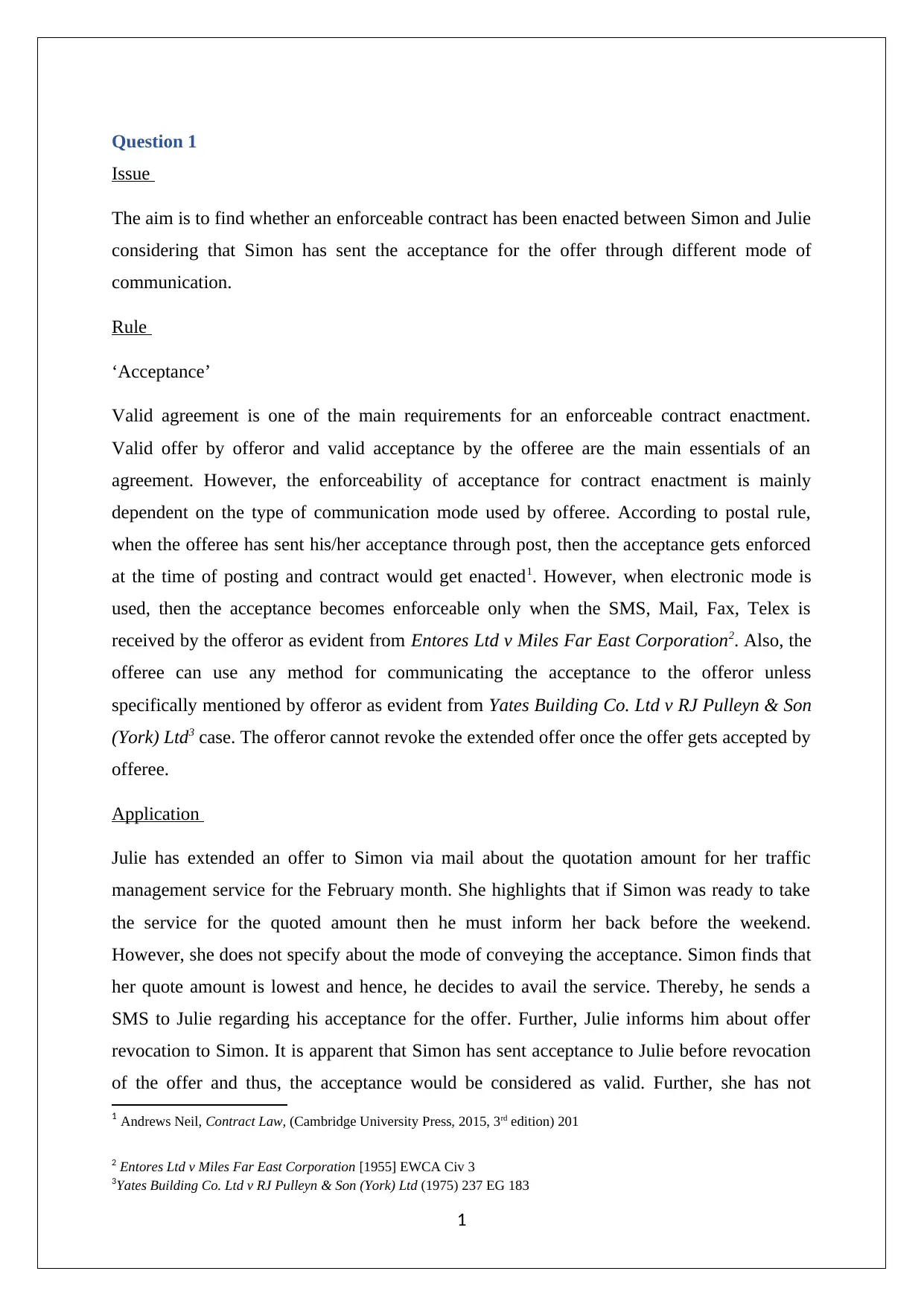
Question 1
Issue
The aim is to find whether an enforceable contract has been enacted between Simon and Julie
considering that Simon has sent the acceptance for the offer through different mode of
communication.
Rule
‘Acceptance’
Valid agreement is one of the main requirements for an enforceable contract enactment.
Valid offer by offeror and valid acceptance by the offeree are the main essentials of an
agreement. However, the enforceability of acceptance for contract enactment is mainly
dependent on the type of communication mode used by offeree. According to postal rule,
when the offeree has sent his/her acceptance through post, then the acceptance gets enforced
at the time of posting and contract would get enacted1. However, when electronic mode is
used, then the acceptance becomes enforceable only when the SMS, Mail, Fax, Telex is
received by the offeror as evident from Entores Ltd v Miles Far East Corporation2. Also, the
offeree can use any method for communicating the acceptance to the offeror unless
specifically mentioned by offeror as evident from Yates Building Co. Ltd v RJ Pulleyn & Son
(York) Ltd3 case. The offeror cannot revoke the extended offer once the offer gets accepted by
offeree.
Application
Julie has extended an offer to Simon via mail about the quotation amount for her traffic
management service for the February month. She highlights that if Simon was ready to take
the service for the quoted amount then he must inform her back before the weekend.
However, she does not specify about the mode of conveying the acceptance. Simon finds that
her quote amount is lowest and hence, he decides to avail the service. Thereby, he sends a
SMS to Julie regarding his acceptance for the offer. Further, Julie informs him about offer
revocation to Simon. It is apparent that Simon has sent acceptance to Julie before revocation
of the offer and thus, the acceptance would be considered as valid. Further, she has not
1 Andrews Neil, Contract Law, (Cambridge University Press, 2015, 3rd edition) 201
2 Entores Ltd v Miles Far East Corporation [1955] EWCA Civ 3
3Yates Building Co. Ltd v RJ Pulleyn & Son (York) Ltd (1975) 237 EG 183
1
Issue
The aim is to find whether an enforceable contract has been enacted between Simon and Julie
considering that Simon has sent the acceptance for the offer through different mode of
communication.
Rule
‘Acceptance’
Valid agreement is one of the main requirements for an enforceable contract enactment.
Valid offer by offeror and valid acceptance by the offeree are the main essentials of an
agreement. However, the enforceability of acceptance for contract enactment is mainly
dependent on the type of communication mode used by offeree. According to postal rule,
when the offeree has sent his/her acceptance through post, then the acceptance gets enforced
at the time of posting and contract would get enacted1. However, when electronic mode is
used, then the acceptance becomes enforceable only when the SMS, Mail, Fax, Telex is
received by the offeror as evident from Entores Ltd v Miles Far East Corporation2. Also, the
offeree can use any method for communicating the acceptance to the offeror unless
specifically mentioned by offeror as evident from Yates Building Co. Ltd v RJ Pulleyn & Son
(York) Ltd3 case. The offeror cannot revoke the extended offer once the offer gets accepted by
offeree.
Application
Julie has extended an offer to Simon via mail about the quotation amount for her traffic
management service for the February month. She highlights that if Simon was ready to take
the service for the quoted amount then he must inform her back before the weekend.
However, she does not specify about the mode of conveying the acceptance. Simon finds that
her quote amount is lowest and hence, he decides to avail the service. Thereby, he sends a
SMS to Julie regarding his acceptance for the offer. Further, Julie informs him about offer
revocation to Simon. It is apparent that Simon has sent acceptance to Julie before revocation
of the offer and thus, the acceptance would be considered as valid. Further, she has not
1 Andrews Neil, Contract Law, (Cambridge University Press, 2015, 3rd edition) 201
2 Entores Ltd v Miles Far East Corporation [1955] EWCA Civ 3
3Yates Building Co. Ltd v RJ Pulleyn & Son (York) Ltd (1975) 237 EG 183
1
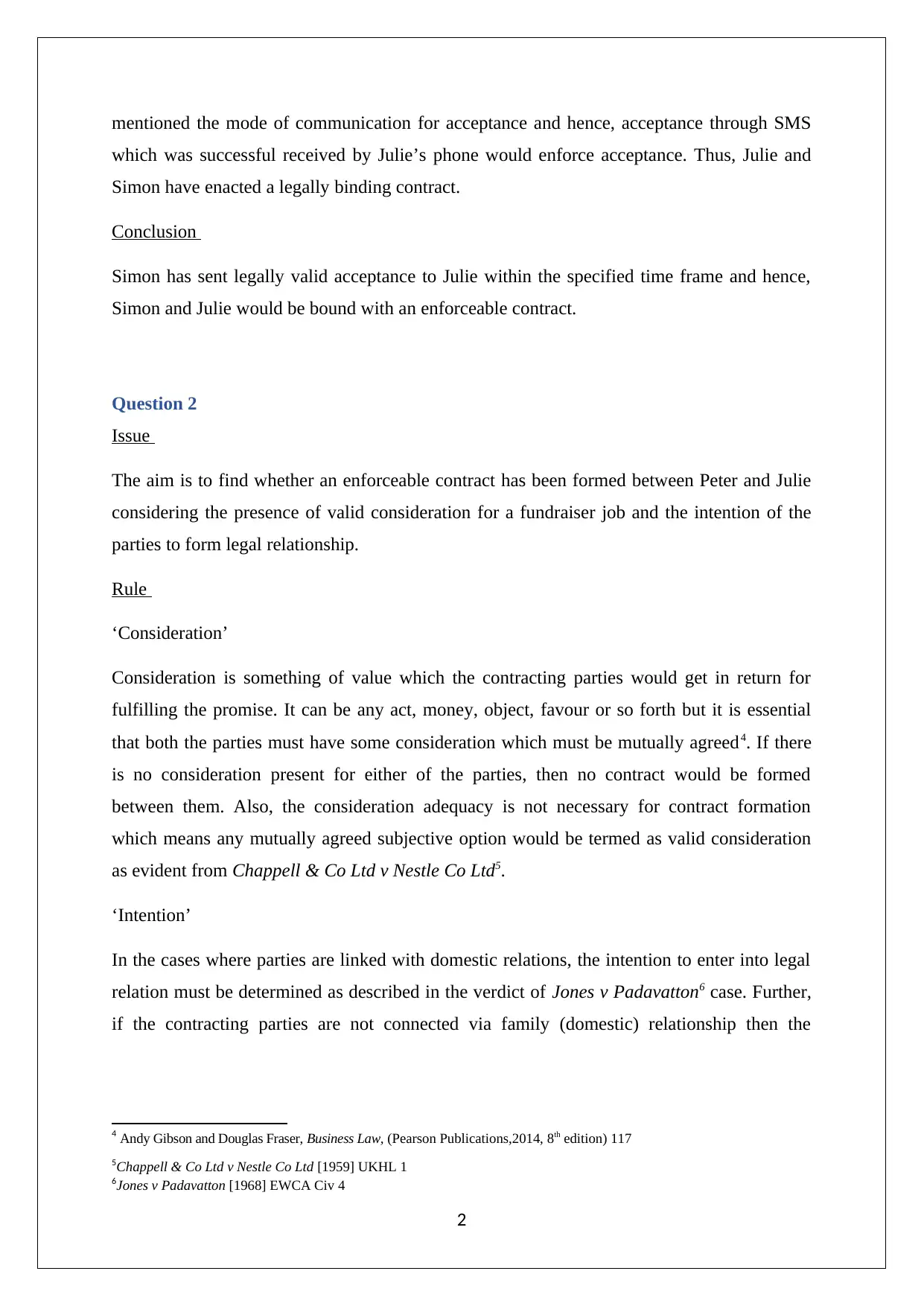
mentioned the mode of communication for acceptance and hence, acceptance through SMS
which was successful received by Julie’s phone would enforce acceptance. Thus, Julie and
Simon have enacted a legally binding contract.
Conclusion
Simon has sent legally valid acceptance to Julie within the specified time frame and hence,
Simon and Julie would be bound with an enforceable contract.
Question 2
Issue
The aim is to find whether an enforceable contract has been formed between Peter and Julie
considering the presence of valid consideration for a fundraiser job and the intention of the
parties to form legal relationship.
Rule
‘Consideration’
Consideration is something of value which the contracting parties would get in return for
fulfilling the promise. It can be any act, money, object, favour or so forth but it is essential
that both the parties must have some consideration which must be mutually agreed4. If there
is no consideration present for either of the parties, then no contract would be formed
between them. Also, the consideration adequacy is not necessary for contract formation
which means any mutually agreed subjective option would be termed as valid consideration
as evident from Chappell & Co Ltd v Nestle Co Ltd5.
‘Intention’
In the cases where parties are linked with domestic relations, the intention to enter into legal
relation must be determined as described in the verdict of Jones v Padavatton6 case. Further,
if the contracting parties are not connected via family (domestic) relationship then the
4 Andy Gibson and Douglas Fraser, Business Law, (Pearson Publications,2014, 8th edition) 117
5Chappell & Co Ltd v Nestle Co Ltd [1959] UKHL 1
6Jones v Padavatton [1968] EWCA Civ 4
2
which was successful received by Julie’s phone would enforce acceptance. Thus, Julie and
Simon have enacted a legally binding contract.
Conclusion
Simon has sent legally valid acceptance to Julie within the specified time frame and hence,
Simon and Julie would be bound with an enforceable contract.
Question 2
Issue
The aim is to find whether an enforceable contract has been formed between Peter and Julie
considering the presence of valid consideration for a fundraiser job and the intention of the
parties to form legal relationship.
Rule
‘Consideration’
Consideration is something of value which the contracting parties would get in return for
fulfilling the promise. It can be any act, money, object, favour or so forth but it is essential
that both the parties must have some consideration which must be mutually agreed4. If there
is no consideration present for either of the parties, then no contract would be formed
between them. Also, the consideration adequacy is not necessary for contract formation
which means any mutually agreed subjective option would be termed as valid consideration
as evident from Chappell & Co Ltd v Nestle Co Ltd5.
‘Intention’
In the cases where parties are linked with domestic relations, the intention to enter into legal
relation must be determined as described in the verdict of Jones v Padavatton6 case. Further,
if the contracting parties are not connected via family (domestic) relationship then the
4 Andy Gibson and Douglas Fraser, Business Law, (Pearson Publications,2014, 8th edition) 117
5Chappell & Co Ltd v Nestle Co Ltd [1959] UKHL 1
6Jones v Padavatton [1968] EWCA Civ 4
2
⊘ This is a preview!⊘
Do you want full access?
Subscribe today to unlock all pages.

Trusted by 1+ million students worldwide
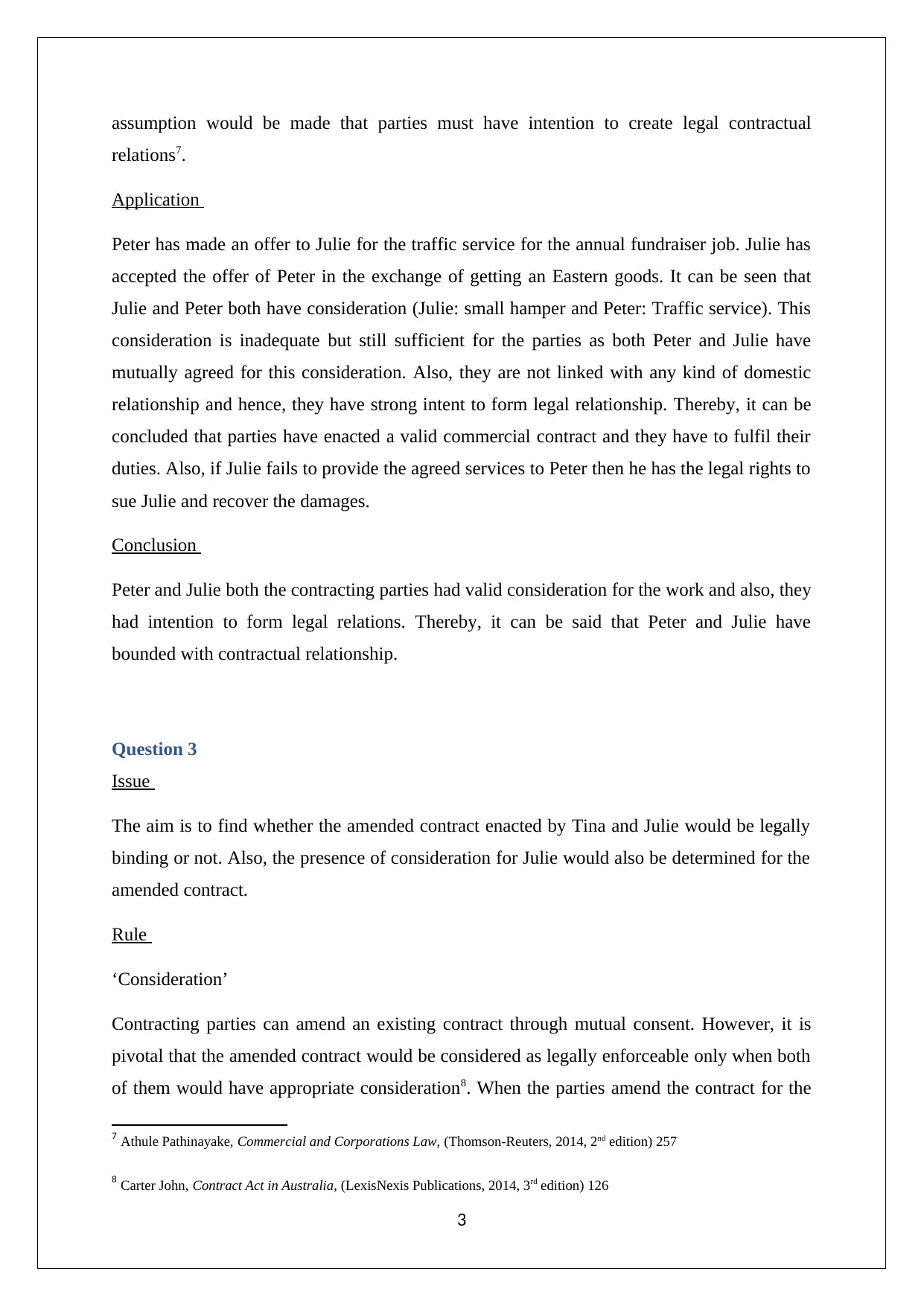
assumption would be made that parties must have intention to create legal contractual
relations7.
Application
Peter has made an offer to Julie for the traffic service for the annual fundraiser job. Julie has
accepted the offer of Peter in the exchange of getting an Eastern goods. It can be seen that
Julie and Peter both have consideration (Julie: small hamper and Peter: Traffic service). This
consideration is inadequate but still sufficient for the parties as both Peter and Julie have
mutually agreed for this consideration. Also, they are not linked with any kind of domestic
relationship and hence, they have strong intent to form legal relationship. Thereby, it can be
concluded that parties have enacted a valid commercial contract and they have to fulfil their
duties. Also, if Julie fails to provide the agreed services to Peter then he has the legal rights to
sue Julie and recover the damages.
Conclusion
Peter and Julie both the contracting parties had valid consideration for the work and also, they
had intention to form legal relations. Thereby, it can be said that Peter and Julie have
bounded with contractual relationship.
Question 3
Issue
The aim is to find whether the amended contract enacted by Tina and Julie would be legally
binding or not. Also, the presence of consideration for Julie would also be determined for the
amended contract.
Rule
‘Consideration’
Contracting parties can amend an existing contract through mutual consent. However, it is
pivotal that the amended contract would be considered as legally enforceable only when both
of them would have appropriate consideration8. When the parties amend the contract for the
7 Athule Pathinayake, Commercial and Corporations Law, (Thomson-Reuters, 2014, 2nd edition) 257
8 Carter John, Contract Act in Australia, (LexisNexis Publications, 2014, 3rd edition) 126
3
relations7.
Application
Peter has made an offer to Julie for the traffic service for the annual fundraiser job. Julie has
accepted the offer of Peter in the exchange of getting an Eastern goods. It can be seen that
Julie and Peter both have consideration (Julie: small hamper and Peter: Traffic service). This
consideration is inadequate but still sufficient for the parties as both Peter and Julie have
mutually agreed for this consideration. Also, they are not linked with any kind of domestic
relationship and hence, they have strong intent to form legal relationship. Thereby, it can be
concluded that parties have enacted a valid commercial contract and they have to fulfil their
duties. Also, if Julie fails to provide the agreed services to Peter then he has the legal rights to
sue Julie and recover the damages.
Conclusion
Peter and Julie both the contracting parties had valid consideration for the work and also, they
had intention to form legal relations. Thereby, it can be said that Peter and Julie have
bounded with contractual relationship.
Question 3
Issue
The aim is to find whether the amended contract enacted by Tina and Julie would be legally
binding or not. Also, the presence of consideration for Julie would also be determined for the
amended contract.
Rule
‘Consideration’
Contracting parties can amend an existing contract through mutual consent. However, it is
pivotal that the amended contract would be considered as legally enforceable only when both
of them would have appropriate consideration8. When the parties amend the contract for the
7 Athule Pathinayake, Commercial and Corporations Law, (Thomson-Reuters, 2014, 2nd edition) 257
8 Carter John, Contract Act in Australia, (LexisNexis Publications, 2014, 3rd edition) 126
3
Paraphrase This Document
Need a fresh take? Get an instant paraphrase of this document with our AI Paraphraser
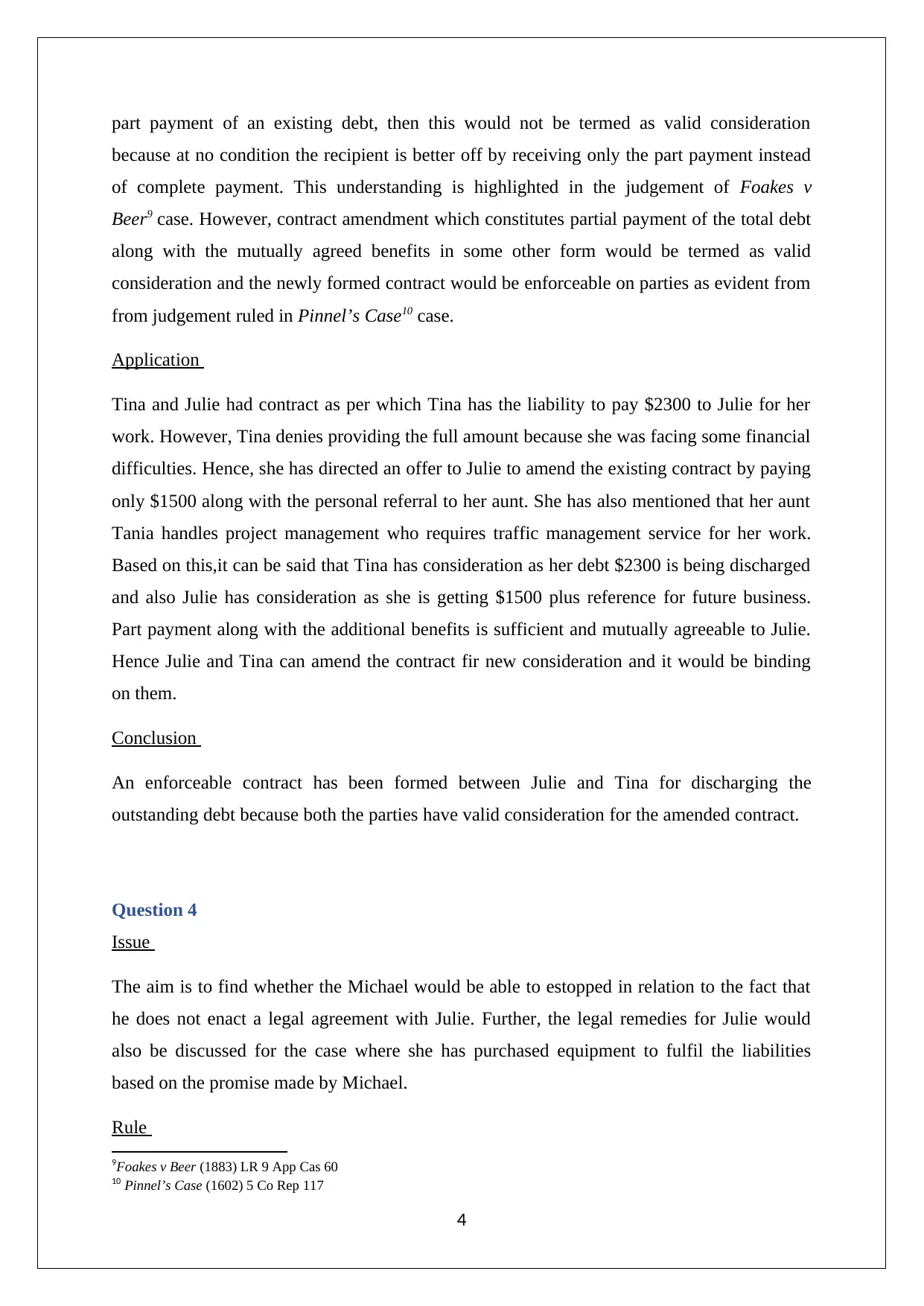
part payment of an existing debt, then this would not be termed as valid consideration
because at no condition the recipient is better off by receiving only the part payment instead
of complete payment. This understanding is highlighted in the judgement of Foakes v
Beer9 case. However, contract amendment which constitutes partial payment of the total debt
along with the mutually agreed benefits in some other form would be termed as valid
consideration and the newly formed contract would be enforceable on parties as evident from
from judgement ruled in Pinnel’s Case10 case.
Application
Tina and Julie had contract as per which Tina has the liability to pay $2300 to Julie for her
work. However, Tina denies providing the full amount because she was facing some financial
difficulties. Hence, she has directed an offer to Julie to amend the existing contract by paying
only $1500 along with the personal referral to her aunt. She has also mentioned that her aunt
Tania handles project management who requires traffic management service for her work.
Based on this,it can be said that Tina has consideration as her debt $2300 is being discharged
and also Julie has consideration as she is getting $1500 plus reference for future business.
Part payment along with the additional benefits is sufficient and mutually agreeable to Julie.
Hence Julie and Tina can amend the contract fir new consideration and it would be binding
on them.
Conclusion
An enforceable contract has been formed between Julie and Tina for discharging the
outstanding debt because both the parties have valid consideration for the amended contract.
Question 4
Issue
The aim is to find whether the Michael would be able to estopped in relation to the fact that
he does not enact a legal agreement with Julie. Further, the legal remedies for Julie would
also be discussed for the case where she has purchased equipment to fulfil the liabilities
based on the promise made by Michael.
Rule
9Foakes v Beer (1883) LR 9 App Cas 60
10 Pinnel’s Case (1602) 5 Co Rep 117
4
because at no condition the recipient is better off by receiving only the part payment instead
of complete payment. This understanding is highlighted in the judgement of Foakes v
Beer9 case. However, contract amendment which constitutes partial payment of the total debt
along with the mutually agreed benefits in some other form would be termed as valid
consideration and the newly formed contract would be enforceable on parties as evident from
from judgement ruled in Pinnel’s Case10 case.
Application
Tina and Julie had contract as per which Tina has the liability to pay $2300 to Julie for her
work. However, Tina denies providing the full amount because she was facing some financial
difficulties. Hence, she has directed an offer to Julie to amend the existing contract by paying
only $1500 along with the personal referral to her aunt. She has also mentioned that her aunt
Tania handles project management who requires traffic management service for her work.
Based on this,it can be said that Tina has consideration as her debt $2300 is being discharged
and also Julie has consideration as she is getting $1500 plus reference for future business.
Part payment along with the additional benefits is sufficient and mutually agreeable to Julie.
Hence Julie and Tina can amend the contract fir new consideration and it would be binding
on them.
Conclusion
An enforceable contract has been formed between Julie and Tina for discharging the
outstanding debt because both the parties have valid consideration for the amended contract.
Question 4
Issue
The aim is to find whether the Michael would be able to estopped in relation to the fact that
he does not enact a legal agreement with Julie. Further, the legal remedies for Julie would
also be discussed for the case where she has purchased equipment to fulfil the liabilities
based on the promise made by Michael.
Rule
9Foakes v Beer (1883) LR 9 App Cas 60
10 Pinnel’s Case (1602) 5 Co Rep 117
4
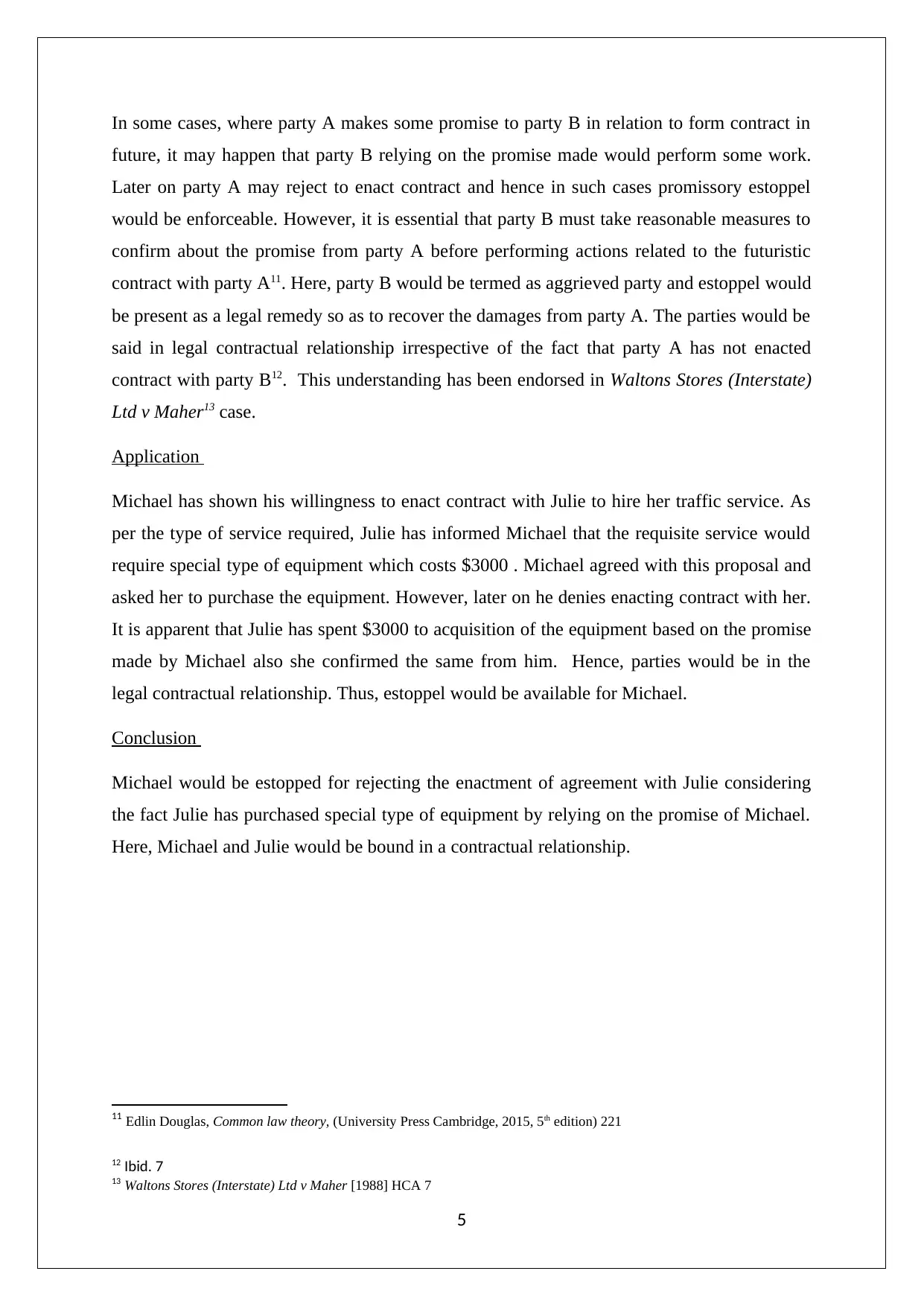
In some cases, where party A makes some promise to party B in relation to form contract in
future, it may happen that party B relying on the promise made would perform some work.
Later on party A may reject to enact contract and hence in such cases promissory estoppel
would be enforceable. However, it is essential that party B must take reasonable measures to
confirm about the promise from party A before performing actions related to the futuristic
contract with party A11. Here, party B would be termed as aggrieved party and estoppel would
be present as a legal remedy so as to recover the damages from party A. The parties would be
said in legal contractual relationship irrespective of the fact that party A has not enacted
contract with party B12. This understanding has been endorsed in Waltons Stores (Interstate)
Ltd v Maher13 case.
Application
Michael has shown his willingness to enact contract with Julie to hire her traffic service. As
per the type of service required, Julie has informed Michael that the requisite service would
require special type of equipment which costs $3000 . Michael agreed with this proposal and
asked her to purchase the equipment. However, later on he denies enacting contract with her.
It is apparent that Julie has spent $3000 to acquisition of the equipment based on the promise
made by Michael also she confirmed the same from him. Hence, parties would be in the
legal contractual relationship. Thus, estoppel would be available for Michael.
Conclusion
Michael would be estopped for rejecting the enactment of agreement with Julie considering
the fact Julie has purchased special type of equipment by relying on the promise of Michael.
Here, Michael and Julie would be bound in a contractual relationship.
11 Edlin Douglas, Common law theory, (University Press Cambridge, 2015, 5th edition) 221
12 Ibid. 7
13 Waltons Stores (Interstate) Ltd v Maher [1988] HCA 7
5
future, it may happen that party B relying on the promise made would perform some work.
Later on party A may reject to enact contract and hence in such cases promissory estoppel
would be enforceable. However, it is essential that party B must take reasonable measures to
confirm about the promise from party A before performing actions related to the futuristic
contract with party A11. Here, party B would be termed as aggrieved party and estoppel would
be present as a legal remedy so as to recover the damages from party A. The parties would be
said in legal contractual relationship irrespective of the fact that party A has not enacted
contract with party B12. This understanding has been endorsed in Waltons Stores (Interstate)
Ltd v Maher13 case.
Application
Michael has shown his willingness to enact contract with Julie to hire her traffic service. As
per the type of service required, Julie has informed Michael that the requisite service would
require special type of equipment which costs $3000 . Michael agreed with this proposal and
asked her to purchase the equipment. However, later on he denies enacting contract with her.
It is apparent that Julie has spent $3000 to acquisition of the equipment based on the promise
made by Michael also she confirmed the same from him. Hence, parties would be in the
legal contractual relationship. Thus, estoppel would be available for Michael.
Conclusion
Michael would be estopped for rejecting the enactment of agreement with Julie considering
the fact Julie has purchased special type of equipment by relying on the promise of Michael.
Here, Michael and Julie would be bound in a contractual relationship.
11 Edlin Douglas, Common law theory, (University Press Cambridge, 2015, 5th edition) 221
12 Ibid. 7
13 Waltons Stores (Interstate) Ltd v Maher [1988] HCA 7
5
⊘ This is a preview!⊘
Do you want full access?
Subscribe today to unlock all pages.

Trusted by 1+ million students worldwide
1 out of 6
Related Documents
Your All-in-One AI-Powered Toolkit for Academic Success.
+13062052269
info@desklib.com
Available 24*7 on WhatsApp / Email
![[object Object]](/_next/static/media/star-bottom.7253800d.svg)
Unlock your academic potential
Copyright © 2020–2026 A2Z Services. All Rights Reserved. Developed and managed by ZUCOL.





